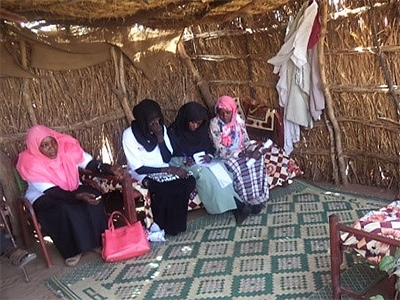Until September 2017, Mariam, a mother of nine and an internally displaced person (IDP) walks miles to get water from an open, hand-dug well. Even as she trekked long distances, she knew the water probably was contaminated and might cause diarrhea and other illnesses. But she had no choice.
"I spent long hours to get water that is not enough for the family," she recalled.
Then the United Methodist Committee on Relief, with funding from the Office of U.S. Foreign Disaster Assistance, worked with Water and Sanitation for Health – WASH – to rehabilitate 10 water hand pumps in the Khazan Jadeed region, where Mariam lives.
In May 2017, UMCOR, with funding support from OFDA, implemented a one-year, multisectoral program in the East Darfur State. Whitney Stovall, program manager for UMCOR's Sudan and South Sudan offices, explained that various stakeholders (government, humanitarian aid and beneficiaries) and sectors (WASH, Shelter, Food Security/Agriculture, Livelihood, Economic-Recovery Management and Health) coordinated efforts.
 |
| Fetching water at Mindi water pump in Kahzan Jadeed Admin Unit in Sheria. PHOTO COURTESY UMCOR SUDAN. |
The project's implementation coincided with an outbreak of Acute Watery Diarrhea (AWD) in the area in June 2017. The epidemic reached its peak that month, with 2,000 cases reported.
At the onset of the outbreak, UMCOR responded by selecting and training 10 community-based hygienists to disseminate hygiene-awareness messages, support chlorination of water at the sources and organize sanitation-cleanup campaigns. Ten latrines were constructed at the AWD isolation center at Khazan Jadeed.
As part of hygiene awareness, UMCOR regularly conducts jerrycans (water-transporting containers) cleanup campaigns at water sources to improve environmental sanitation and reduce the causes of infection related to water-borne diseases.
A physician at Khazan Jadeed hospital credited UMCOR with saving lives.
"UMCOR had a constructive effort in reducing the spread of AWD in the area," the doctor said. "The patients at the AWD center used to defecate in the open spaces before construction of the latrines, which diminished the spread of the disease." While 198 new cases of AWD infection were reported between June 24 and July 27, 2017, by early August, no cases were reported.
Mariam is one of many IDPs whose lives have changed dramatically, thanks to community-based hygiene education, latrines construction and improved water sources.
"I now get safe and sufficient water," she said.
Barbara Dunlap-Berg, retired writer and editor, United Methodist Communications.
One of six churchwide Special Sundays with offerings of The United Methodist Church, UMCOR Sunday calls United Methodists to share the goodness of life with those who hurt. Your gifts to UMCOR Sunday lay the foundation for the United Methodist Committee on Relief (UMCOR) to share God's love with communities everywhere. The special offering underwrites UMCOR's "costs of doing business." This helps UMCOR to keep the promise that 100 percent of any gift to a specific UMCOR project will go toward that project, not administrative costs.
When you give generously on UMCOR Sunday, you make a difference in the lives of people who hurt. Give now.





